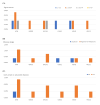Clinical relevance of protein-truncating variants of germline DNA repair genes in prostate cancer
- PMID: 39455978
- PMCID: PMC11520037
- DOI: 10.1186/s12885-024-13045-4
Clinical relevance of protein-truncating variants of germline DNA repair genes in prostate cancer
Abstract
Background: Interpreting genetic variants remains a challenge in prostate cancer (PCa). Although many annotation tools are available for prioritizing causal variants, the clinical relevance of these variants is rarely studied.
Methods: We collected a cohort study that included 274 PCa patients from June 2017 to December 2020 and sequenced 19 DNA damage repair (DDR) genes in these patients and explored the clinical consequence of these different approaches. We also examined all-cause and PCa-specific survival in DDR gene mutation carriers compared to non-carriers after androgen receptor (AR)-directed therapy.
Results: We identified 13 variants from 19 DDR genes in a total of 14 (5.1%) patients who had at least one presumed pathogenic mutation using different annotation methods. Four variants were annotated as pathogenic, 11 variants were predicted as protein-truncating variants (PTVs), four variants received proxy-deleterious (Combined Annotation-Dependent Depletion scores of > 30), and only one variant was identified as a pathogenic variant or as having a functional effect by all three methods. PCa patients with PTVs were significantly associated with early onset, high cancer stage, and a worse response to AR-directed treatment. However, patients carrying a proxy-deleterious variant were only associated with a higher T (tumor) stage and N (node) stage than those without such a variant, but not associated with other clinical characteristics. In patients treated with AR-directed therapy, patients with a PTV showed an increased risk of all-cause death (adjusted hazard ratio (aHR) = 3.51, 95% confidence interval (CI): 1.06 ~ 11.56) and PCa-specific death (aHR = 4.49, 95% CI: 1.87 ~ 10.77) compared to non-PTV carriers after adjustment. We were unable to examine gene-specific risks due to the small number of patients.
Conclusions: PTVs may assist in guiding treatment and early screening in PCa, while population-specific data for pathogenic variants are still being amassed.
Keywords: DNA repair gene; Germline mutation; Prostate cancer; Protein-truncating variant.
© 2024. The Author(s).
Conflict of interest statement
The authors declare no competing interests.
Figures


References
-
- Beebe-Dimmer JL, Drake EA, Dunn RL, Bock CH, Montie JE, Cooney KA. Association between family history of prostate and breast cancer among African-American men with prostate cancer. Urology. 2006;68(5):1072–6. - PubMed
MeSH terms
Substances
Grants and funding
LinkOut - more resources
Full Text Sources
Medical
Research Materials

